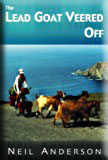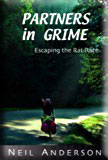|
Dachau We had breakfast with Martin. Ann had already left for work and the boys had gone to school. Martin told us he and Ann had backpacked in Canada and the u.s. We were appalled to hear that a fellow Canadian had uttered the mindless remark, "Germany? Where in the u.s. is that?" I was tempted to ask Martin if he was certain he was speaking to a Canadian at the time and not an American trying to pass himself off as a Canadian. Martin had a Mac computer so I showed him how to create custom icons. Being the artistic type he quickly created a unique folder for his son. "Next time you can stay longer and show me some more tricks," he said. A new smooth blacktopped bike path led us the short eight kilometers to Dachau. It was great to be away from traffic and able to look around at the scenery without worrying about being mowed over or steering into a bone crunching pothole. It was an idyllic pastoral area with fields, small woods and burbling creeks. A wonderful day to be alive. The Dachau museum had pictures of the concentration camp. My impression of our visit was exemplified by the first words I heard upon entry. I had parked my bike near the door and was about to peel an orange when a fellow speaking to a group loudly proclaimed: "I was a medical surgeon who arrived three days before the end of the war. When we arrived they had genitalia suspended on a wire across the middle of the compound." I instantly lost my appetite. The entire visit was a bleak experience for me. A group of Jewish teenagers were in the museum. By the time their tour leader had completed his talk many of the youths were in tears. I could understand why. Everything about Dachau and Hitler seemed too horrific to be true. The museum played a very powerful film. I was moved to tears by the film. The graphic pictures were enough to disturb anyone. One image in particular will always remain with me: A mass grave filled with emaciated bodies and in the background young, strong, healthy Nazi soldiers ran along the edge of the grave as if out for an evening jog. The start contrast of healthy oppressors with starving victims-power and powerless-was like a kick to the stomach. Even more disturbing was the casual unconcern of the young soldiers. Hitler had an inconceivable capacity for evil, but thousands more cooperated and felt little or nothing for the suffering and dying prisoners. The fact that those people (made real through the movie camera) could carry on as if mass graves and unimaginable cruelty were normal made me face the dark side of human nature. The gas chamber at Dachau wasn't hooked up-but not due to humanitarian reasons-they just hadn't got around to it because there was a gas shortage. At other concentration camps prisoners were herded into gas chambers they thought were showers. A sign read: "Wash your hands." When the film was over I was ready to leave the camp-too much reality for me. But there was still one more chilling feature to pass. Outside the museum was a grisly art memorial of blackened skeletal people in twisted and grotesque positions. Embossed on a monument was the phrase: "Never Again." I wanted desperately to believe the hopeful words, but the skeptic in me prevented the masterpiece from providing any comfort. Our travel in Europe had shown that history often repeated itself. Man had a violent past. In our modern era, Hitler was merely the most despicable example of man's cruelty to fellow man. Riding into, and again while leaving the camp, I was struck by the nondistinctiveness of the surroundings. Dachau could be any small town. The forests and fields surrounding Dachau could be farmland in a thousand similar places. All of my previously held misconceptions that Dachau, Hitler, and the Nazi's were unique to Germany disappeared. Germany had simply been an unfortunate victim of chance. Nothing extraordinary within its borders had produced Hitler. It was simply more comforting for the rest of the world to believe that. The gloom of Dachau stayed with me all day, even when we stopped to eat lunch beside a tranquil lake. Ducks swam in the misty water as people strolled around its shores. I couldn't help wondering if life outside the camps had continued normally in Hitler's time as well. The film said many Germans didn't know what was occurring within the camp walls. They had suspicions, but that was all. Had people gamboled gaily around that same lake while thousands suffered and died only a few kilometers away? We followed the bike path into Munich. I was apprehensive about riding in such a large city, but my fears were soon proven to be groundless. It was easy to get around Munich with all its bike paths. Following Martin's detailed directions and our Munch map we made our way to Franz and Louisa's flat. After a lengthy process of unloading and storing our bicycles downstairs in a utility room we were shown the shower facilities. We followed showers with an excellent spaghetti dinner accompanied by salad, cheese and grapes. They had cases of red wine from a local supplier. We drank two bottles of the "house" wine as Franz called it. To cap the evening Franz and Louise invited us to stay a second day. Their two cats were named Mira and Iggy. Mira liked to jump off high places. The balcony was netted in case Mira wanted to take flying lessons. Iggy spent most of his time hiding. Franz said, "Iggy only comes around when I have to work on the computer. Then he climbs on the keyboard. He is jealous of me touching the keyboard." |
|
|


